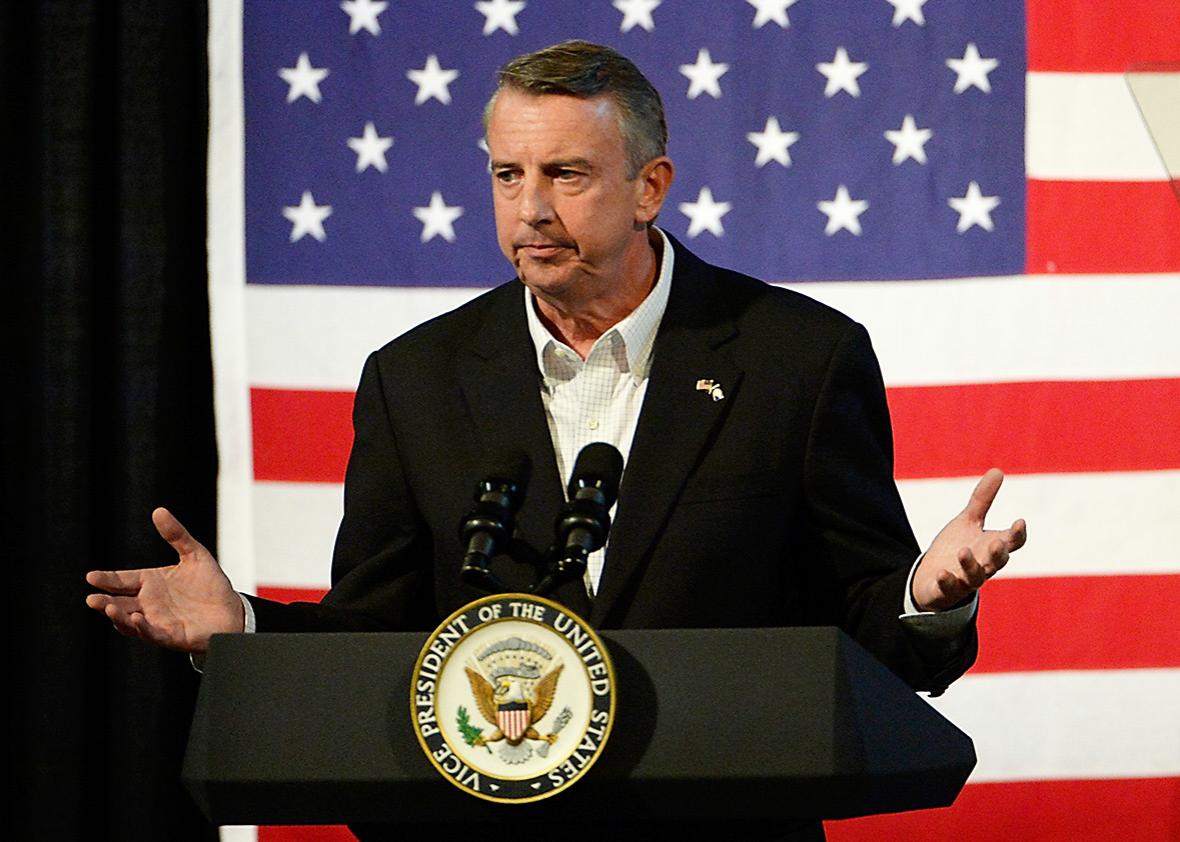Since the summer, Ed Gillespie’s message in the race for governor of Virginia has been a version of the one that Donald Trump rode to the White House: Virginians are under threat from criminals and immigrants (and immigrant criminals), and only law and order will keep them safe. Gillespie’s advertisements have emphasized this point, with a focus on MS-13, the Salvadoran gang that, in his racialized and inflammatory rhetoric, has brought a reign of violence and mayhem to the commonwealth.
Gillespie’s latest ad takes a different approach to the same, basic idea. In a 60-second spot, the Republican gubernatorial nominee speaks straight to camera to condemn opponent Ralph Northam and Democratic incumbent Terry McAuliffe for a key policy of the present administration: the automatic restoration of voting rights for Virginians with felony convictions. “Ralph Northam’s policy of automatic restoration of rights for unrepentant, unreformed, violent criminals is wrong,” Gillespie tells viewers.
With this ad, Gillespie does more than just paint a picture of Virginia as rife with crime and danger; he stakes his ground against the expansion of voting rights. It’s a position he shares with Republicans across the country. For as much as Donald Trump is to blame for the recent subversion of democracy, Gillespie is a reminder that the problem predates the president. For the past decade, mainstream Republicans have backed efforts to restrict and suppress the vote. If there’s anything different about Gillespie, it’s that he’s willing to state the premise.
The ad focuses on McAuliffe’s aggressive program to combat felon disenfranchisement in Virginia. In 2014, upon taking office, he broadened the number of people eligible to have their voting rights restored. The following year, McAuliffe removed the requirement that former felons pay court costs and fees to have those rights restored. In 2016, he issued an executive order restoring voting rights to all Virginians with felony convictions who had served their time. After the state Supreme Court invalidated this and similar orders, ruling the governor did not have the right to grant clemency en masse, McAuliffe took the path of least resistance and announced a plan to restore felon voting rights person by person. As of April, the governor has restored rights to more than 150,000 Virginians.
Gillespie’s attack is drawn from the lawsuit that ended McAuliffe’s attempt at a blanket restoration of rights. That move, meant only for felons that had served all of their sentences, including probation, inadvertently restored rights to 132 sex offenders who were still in custody, as well as several convicted killers who were on probation in other states. Republicans sued, and won, with the state Supreme Court ruling that McAuliffe had overstepped his powers to grant clemency. Gillespie conflates this with the individualized effort to restore voting rights and pledges a harder line, although one that doesn’t preclude the restoration of rights for some former felons.
While the ad focuses on felons, there’s good reason to doubt Gillespie’s broader commitment to voting rights. Gillespie supports Virginia’s voter identification law, and during his 2014 race to unseat Mark Warner in the U.S Senate, opposed efforts to restore “pre-clearance” to the Voting Rights Act, which provides federal oversight to the state’s voting laws. In 2010, after becoming chairman of the Republican State Leadership Committee, Gillespie led the charge to redraw state legislative maps to favor Republicans, a move that—in Virginia—led to aggressive gerrymandering of predominantly black communities.
Gillespie’s approach is typical of Republicans across the country, who back voter suppression as a matter of course. Republicans in North Carolina used “surgical precision” to exclude black residents from the polls, Republicans in Kansas sought to make voting dependent on proof-of-citizenship, Republicans in Texas gerrymandered the state to dilute minority voting power, and Republicans in Wisconsin may have used strict voter identification requirements and deep cuts to access to discourage thousands of voters and secure the state for Trump in the 2016 presidential election. In the White House, Republicans like Kris Kobach hope to use the power of the federal government to craft a national regime of voter suppression.
Gillespie’s campaign for governor of Virginia—and his recent ads in particular—serves as a reminder that Trump did not emerge ex nihilo into national life. His illiberal impulses have a clear antecedent in a Republican Party that has turned against any expansive notion of voting rights or voter participation. Far from an aberration, Donald Trump in many ways represents the culmination of ideas and thinking with a long pedigree in conservative politics.
